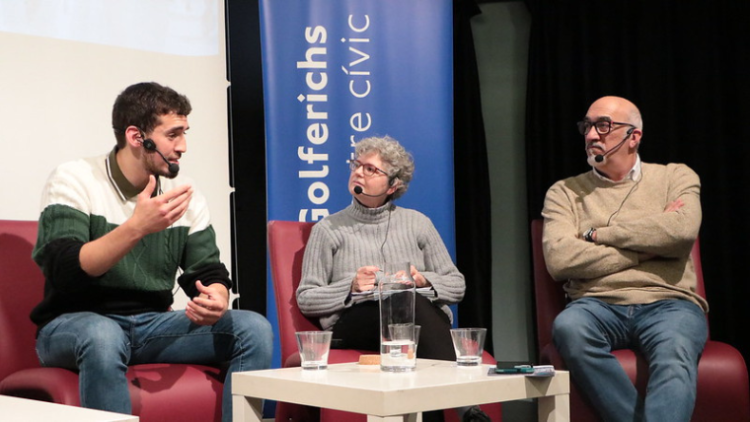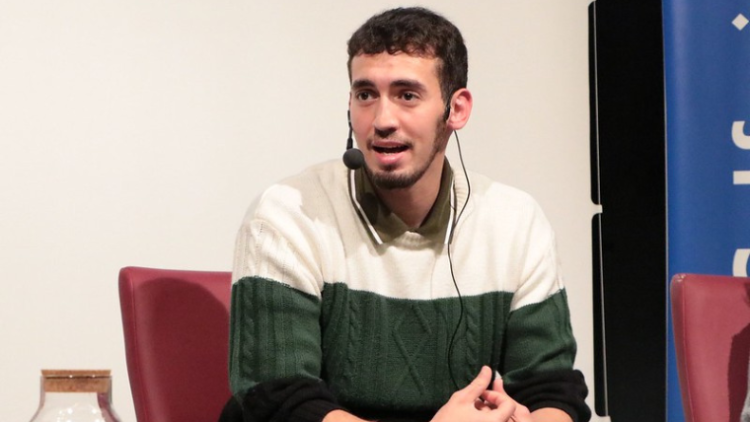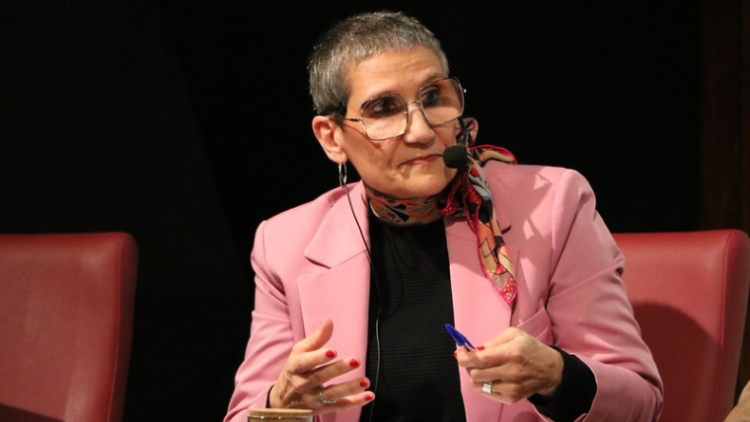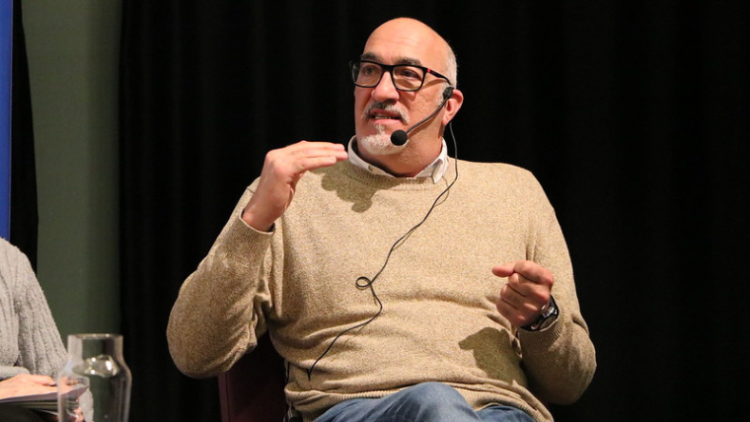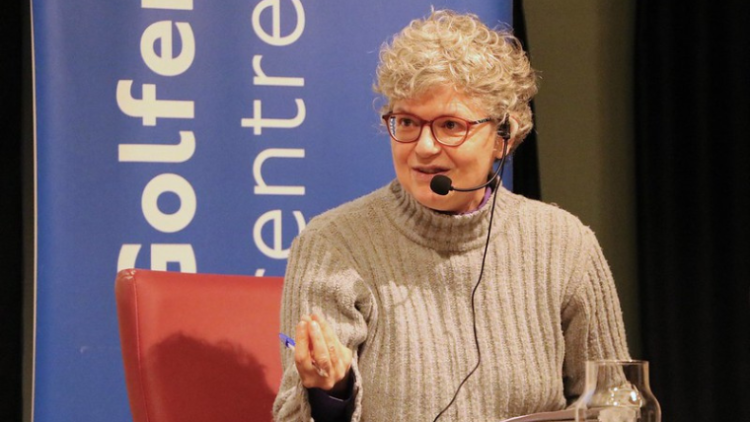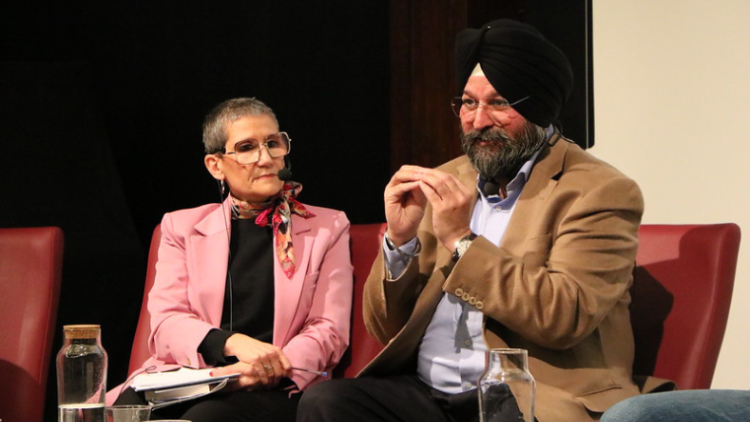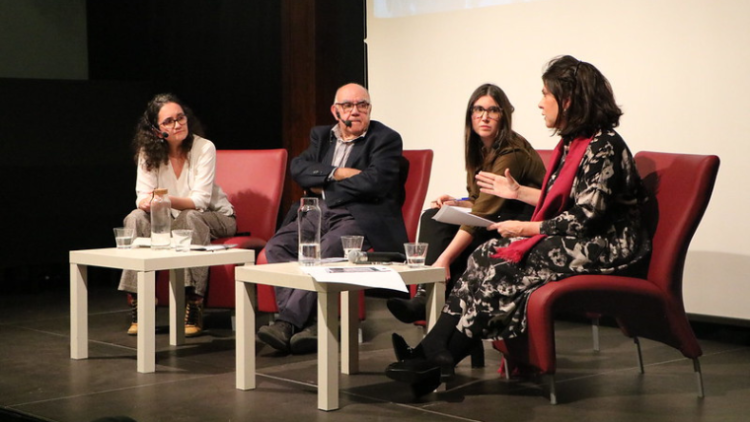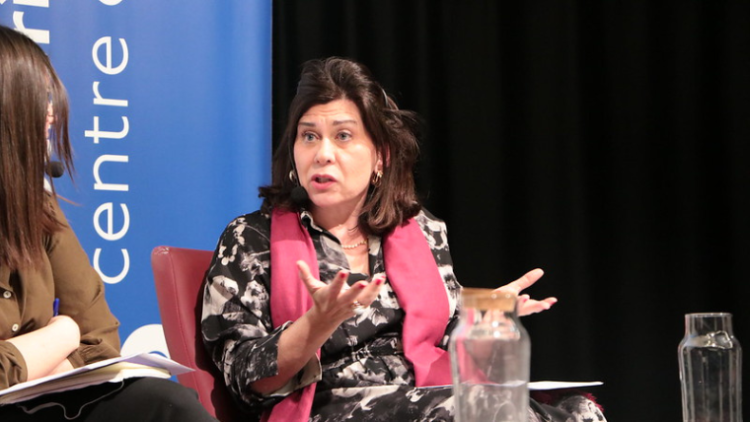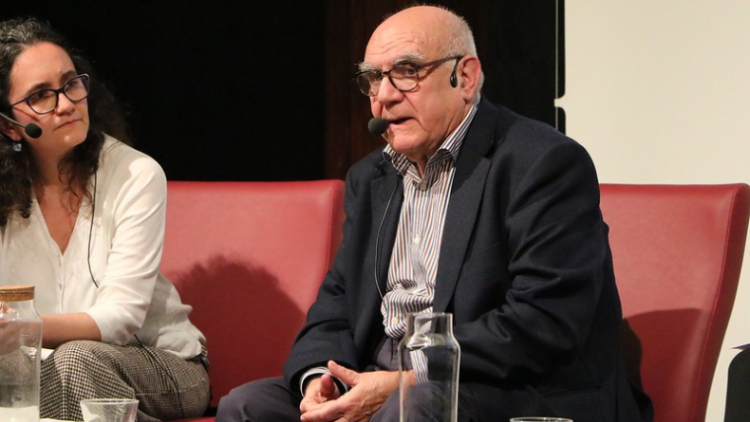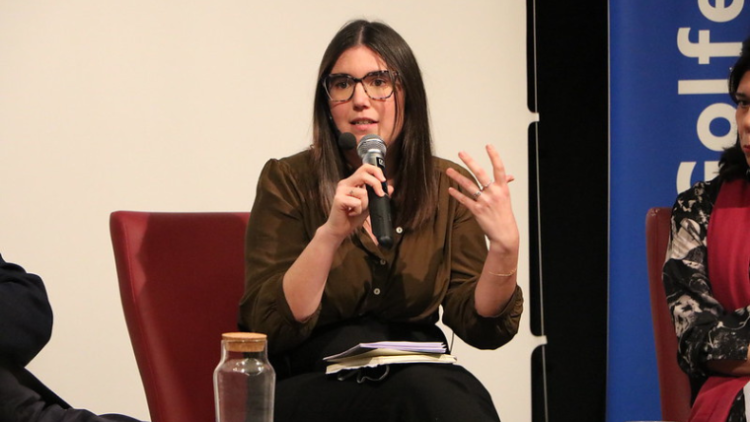‘We have to ask what kind of society we want to explain why the right to religious freedom is worth defending’, Hatim Azahri
On 28 February of this year, Casa Golferichs hosted the activity entitled ‘Why do we have to defend the right to religious freedom?’ organised by the Office for Religious Affairs (OAR) in conjunction with the Human Rights Resources Centre (CRDH). It consisted of two consecutive spaces of dialogue, one with people representing the different religious communities in Barcelona, and the other with scholars from the fields of anthropology, the sociology of religion and law, who shared experiences and reflections on the guarantee of the right to religious freedom in the city and the spaces where this right must still be claimed.
The right to religious freedom is a fundamental right contained in article 18 of the Universal Declaration of Human Rights. As such, it is also recognised in the Spanish and Catalan regulatory framework. Similarly, the 2021-2030 Barcelona Interculturality Plan includes recognition of the different religious and faith-based beliefs and traditions as part of the city’s cultural diversity. Furthermore, the Religious Affairs Office’s goal is to guarantee the right to religious freedom and to raise Barcelona residents’ awareness, provide information and recognition of religious plurality and generate spaces of participation, dialogue and positive interaction among the different faith communities.
However, the difficulty defining this right and determining the concepts associated with it, as well as effectively guaranteeing it to city residents, means that it is a sphere that deserves further reflection and work. With this vision in mind, last Wednesday 28 February the Office for Religious Affairs (OAR), in conjunction with the Human Rights Resources Centre – CRDH, hosted the activity called ‘Why should we defend religious freedom?’at Casa Golferichs. The goal of the event was to prompt a dialogue that contributes to working towards a society where there is no need to ask that question.
The session was opened by Sara Belbeida Bedoui, Commissioner for Citizen Relations and Cultural and Religious Diversity at Barcelona City Council, with a speech in which she stated that even though the right to religious freedom may sometimes go unnoticed in social debates, it is not only an essential way of guaranteeing democracy and social peace but also a cornerstone of citizen cohesion. After all, ‘it is a right which unites us as human beings beyond our individual beliefs and practices, which enables the city to be enriched with a very different perspectives’.
Her talk was followed bytwo panel discussions. The first one focused on giving a voice to different Barcelona residents so that they could reflect and share their experiences on the reality of the practice of religious freedom in their everyday lives in the city. It was moderated by Khalid Ghali Bada, coordinator of the Religious Affairs Office. The participants were Rafael Fajardo, an officer in the Transforma’t service of the Sant Andreu district and an evangelical pastor at the Filadèlfia mission; Dharam Paul Singh Ackoo, a member of the Gurdwara Guru Darshan Sahib of Barcelona; Maria Gassiot, the general head of the Women’s Area in Catalonia of Sokka Gakkai Espanya; Hatim Azahri, the founder of Joves Units del Poble-sec; and Alicia Guidonet, an anthropologist and head of the Inter-religious Space of the Fundació MigraStudium.
This panel discussion on experiences started with the question that is the title of the event. The different participants’ responses mentioned the two essential dimensions of religion: the individual and the social. Rafael Fajardo balanced these perspectives in this way: ‘Just as nobody questions the right to breathe or eat, nobody should question the right to religious freedom, a need that is imprinted on our DNA, because people need to worship, with or without faith. At the same time, a city where faith is rooted is a city with values and richness.’ Likewise, Maria Gassiot believes that religion is a very profound part of people’s lives, so defending this right ‘is not only an ethical imperative but also a fundamental need of society, because spirituality can provide solutions when tackling the social challenges we’re facing’. Alicia Guidonet also believes that religion is a uniquely human trait, and that ‘these differences, as well as the values different faiths share, are what feed society’. Hatim Azahri concluded this part with another question: ‘What kind of society do we want?’. He noted that this question requires us to share spaces and perspectives, which ‘is only possible if a right like this one is defended’.
Thus, the second round of this first panel discussion sought to paint an accurate picture of the actual exercise of the right to religious freedom by contrasting the recognised legal framework with the everyday experiences of the people and communities represented on the panel. All the speakers concurred that prejudices and ignorance often limit people’s freedom to practise their own religion. Rafael Fajardo gave one example when stating the difficulties the Roma community face when practising their essentially musical, collective praise, primarily due to the impossibility of finding spaces: ‘When we Roma make religious music in our locales, we do it with noise and passion, and this leads residents to exert pressure and ask that they be closed. Therefore, religious freedom is there, but we face huge constraints on expressing our faith due to prejudices.’ This perspective resembles that of Hatim Azahri, who cited the example of the impossibility of setting up a prayer space at the university, a sign of the ‘incongruence between the secularism of the state and religious freedom and their convergence in our society’. According to Azahri, this dynamic means that ‘a society that is supposedly welcoming ceases to be so when you make demands on its institutions, and the discourses of respect, freedom and welcome are nothing more than lip service’.
According to Maria Gassiot, the reasons for this imbalance are fear and ignorance, ‘which lead us to fear praying crowds but not hordes of people at a concert, a fear that is associated with religion’s ability to subvert the structures and the status quo’. Dharam Paul Singh Ackoo furthered this stance by citing the example of having been taunted for wearing a turban and not being able to legally register marriages at his temple, as well as the difficulty finding spaces for certain events. Yet at the same time, he appreciated the perceived an evolution compared to the issues he encountered when he arrived in Barcelona, and he encouraged the dialogue with institutions to continue. This ‘should also come from the religious communities affected, which should be able to convey their problems and complaints and make themselves seen’.
For this reason, the conclusion of the first panel discussion offered each member the chance to outline their associations’ social and informative initiatives. Maria Gassiot mentioned the Buddhist Film Festival of Catalonia, which is organised by the Catalan Coordinator of Buddhist Entities. Dharam Paul Singh Ackoo invited the audience to participate in one of the free lunches held at the Gurdwara Guru Darshan Sahib. Hatim Azahri, in turn, praised the ‘news struggle’ of the Associació de Joves del Poble-sec, which promotes dialogue and fights stigmatisation in a neighbourhood where 35% of the residents come from different backgrounds. This struggle is shared by the Inter-religious Space of the Fundació MigraStudium, whose efforts to promote communication and empathy were mentioned by Alicia Guidonet. Likewise, Rafael Fajardo defended the social branch of evangelical churches: ‘This is what we have to bring to the streets to change the view of noise due to the social contributions of all faith associations’, he said.
The second panel discussion of the day took a more expert look at the right to religious freedom with the goal of offering a more theoretical, informative and historical snapshot of it. It was moderated by Esther Pardo Herrero, coordinator of the Human Rights Resources Centre, and the participants were Francisca Pérez-Madrid, a professor at the Universitat de Barcelona specialising in Church Law and the principal researcher on the project ‘Gender equality and beliefs within the framework of the 2030 Agenda’; Rosa Martínez-Cuadros, the Juan de la Cierva post-doctoral researcher at the Universitat de Barcelona and a member of the ISOR (Research in the Sociology of Religion) and GENI (Research Group on Gender, Identity and Diversity) research groups; and Manuel Delgado Ruiz, a professor of Social Anthropology at the Universitat de Barcelona specialising in religious violence and ritual, and the director of the GRECS (Research Group on Social Exclusion and Control). Unfortunately, Oumaya Amghar Ait Moussa, a political scientist and management officer at the IMed (European Institute of the Mediterranean), was unable to participate.
The three speakers once again started by answering the core question of the day, this time from their field of expertise. Briefly, they claimed that it is essential to view diversity as normal in a diverse society. As Rosa Martínez-Cuadros said: ‘There is a real demand for this right in society, and the fact that it has stemmed from the a secularisation process does not mean that it has ceased being important in people’s lives’. Indeed, as Francisca Pérez-Madrid stressed, ‘from the legal standpoint everyone is equal; there aren’t some people and then the diverse people’. Following that argument, Manuel Delgado believes that the fact that secularism leads to actions like denying places of prayer at the university is contradictory and proves that the lack of knowledge of the right to religious freedom often comes precisely from secular positions: ‘Secularism is utterly hostile towards religion, to such an extent that it has become a kind of dogmatism’.
This launched the second round of this panel, where the speakers reflected on the definition of the right to religious freedom in a context in which faith is confined to the private sphere. Francisca Pérez-Madrid began with a reflection on the supposed neutrality often attributed to public space ‘There is assumed to be a commitment to neutrality, but what is more neutral: eliminating any religious expression from public space or making room for everyonethere?’ Dovetailing with that position, Delgado described secularism as today’s redefinition of religion and spirituality as something private, individual and reflective that has no place in social and public life.
Connecting with the first panel, the different speakers in this second space of debate concurred with the conclusion that these situations in which the right to religious freedom is violated in administrative spheres are directly related to the stigmatisation of the communities and their faith. Rosa Martínez-Cuadros cited the case of Islam as an articulation between religious practice, discrimination and ignorance which leads society to fail to understand that religious freedom is a real claim ‘even though it is often looked down upon y by non-believers’.
To bridge these distances, Manuel Delgado proposed a perspective of ‘absolute secularism, that is, the public sphere’s total indifference to religion’ and refusal to even determine what religion is: ‘When we try to define religion, they contaminate it with often Eurocentric perspectives’. This perspective suggested by Delgado would entail ‘fitting religious freedom into freedom of conscience, so that when processions are held, for example, they fall under the aegis of the same right as demonstrations’. However, the other two speakers did not concur with his stance. Rosa Martínez-Cuadros stated that ‘the current model to offset vulnerabilities and the specificity of religion precisely enables these vulnerabilities to be brought up’. Therefore, according to Francisca Pérez-Madrid, the public administration should focus on collaborative, ‘positive secularism’.
To sum up, the event compared two perspectives, the academic and the one based directly on residents’ experiences, which painted a portrait of the defence and guarantee of the right to religious freedom in Barcelona, as well as aspects that are associated and connected with it, such as the discrimination and stigmatisation of faith and the communities that practise it. In conclusion, both perspectives highlighted the need to continue defending the right to religious freedom because religious communities’ needs are not being met right now; that is, even though their rights are enshrined within the legal framework, they are not truly enforced in such a way that protects all their expressions and practices, or they encounter a range of difficulties when exercising these rights. This is an incongruence that, according to the vast majority of participants, could be resolved through social dialogue and the alignment of communities and institutions, which is ultimately one of the goals of these spaces of dialogue.

